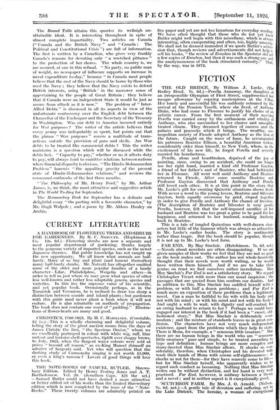FAR END. By May Sinclair. (Hutchinson. 7s. 6d. net.) —Novels
about novelists are often disappointing. If we are given samples of their works we feel that they are not so good as the book makes out. The author has not whole-heartcdly thought that their novels were worth writing, or he would have written them himself. And if we are to take their genius on trust we find ourselves rather incredulous. Miss May Sinclair's Far End is not a satisfactory story. We regard Christopher Vivart with more than our usual suspicion ; the passages that are quoted from him confirm our doubts. And in addition to this, Miss Sinclair has saddled herself with a problem, or with half a dozen problems ; and Far End is much more an exposition of these problems than a legitimate novel. Can a man be faithful to his wife with his body and not with his mind ; or with his mind and not with his body? And ought a wife to wait, with dignity and self-control, for an erring husband to return to her ? Perhaps we could have engaged our interest in the book if it had been a " sweet, old- fashioned story." But Miss Sinclair is deliberately semi. modern ; and the mixture of standards leaves us in great con- fusion. The characters have not very much independent existence, apart from the problems which they help to state. There is Mona, for example, a " sensuous little creature." But there are no human beings in the world who are " sensuous little creatures " pure and simple, to be treated according to type and definition • human beings are more complex and many-faceted than Miss Sinclair allows. It 'shocks us mu' siderably, therefore, when Christopher and his devoted wife wash their hands of Mona with serene self-righteousness : it shocks us not for them—for they have scarcely come to life— but for Miss Sinclair herself, who apparently wishes us to regard such conduct as becoming. Nothing that Miss Sinclair writes can be without distinction, and her hand is very well practised. Far End, hoivever, is midway between a thesis and a novel ; and in neither aspect is it exceptionally good.






































 Previous page
Previous page